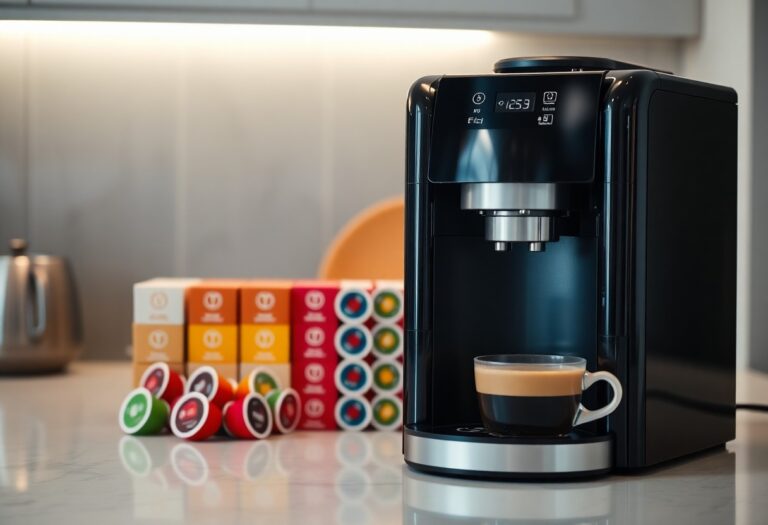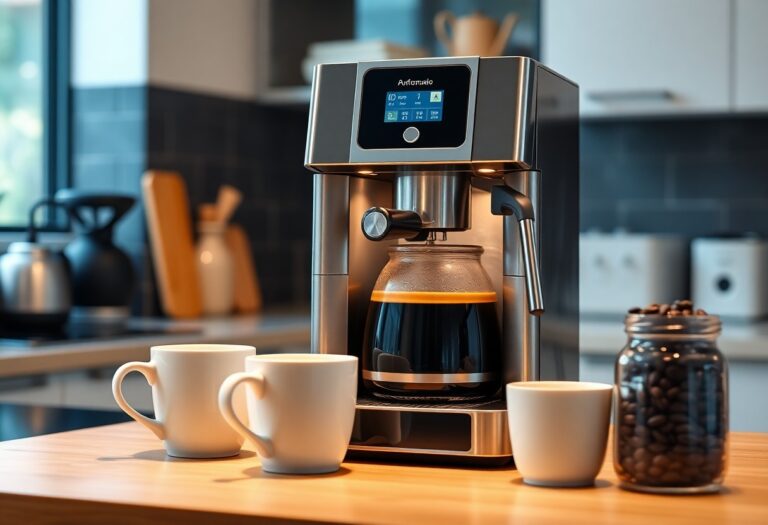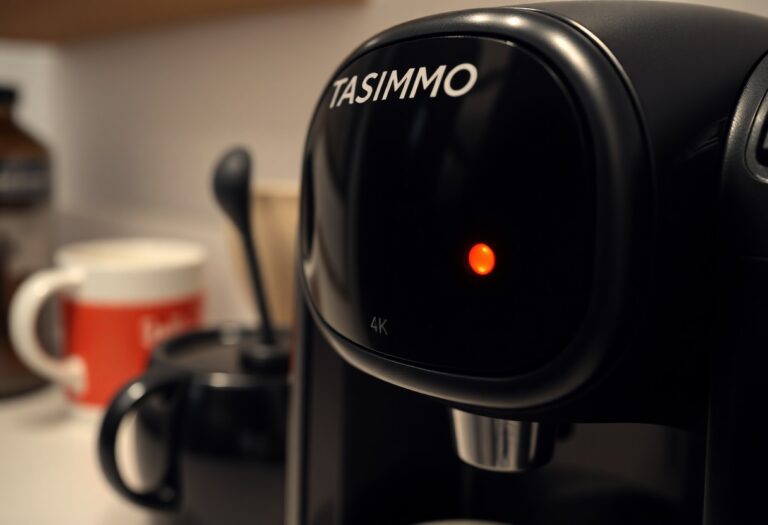What Can I Descale My Coffee Machine With – DIY Solutions
Many coffee lovers may not realize the importance of regularly descaling their machines to ensure optimal performance. Descaling can prevent mineral buildup and extend the life of your coffee maker. You can use simple, DIY solutions like vinegar or baking soda to tackle this task effectively. These methods are not only cost-effective but also environmentally friendly. For a deeper dive, check out this article on Cleaning a Coffee Pot: Vinegar vs. Descaling Solution. Keep your coffee flowing smoothly with these easy tips!
Key Takeaways:
- Common household items like vinegar, lemon juice, and baking soda can effectively descale coffee machines.
- Mix equal parts of vinegar and water for a simple and natural descaling solution.
- Lemon juice can be used in a similar way as vinegar, providing a fresh scent along with descaling properties.
- Baking soda can help neutralize odors and assist in cleaning, but should be used cautiously to avoid clogs.
- Always follow the manufacturer’s guidelines, as some machines may require specific descaling agents.
The Chemistry of Descaling: Why It Matters
Understanding the chemistry behind descaling reveals why it plays a vital role in preserving your coffee machine’s performance. Limescale, primarily composed of calcium carbonate, accumulates when minerals from water deposit on heating elements and other internal surfaces. This buildup not only affects the taste of your coffee but can also impede the water flow, leading to inefficient brewing and increased energy consumption. Regular descaling ensures that these minerals are removed, maintaining the quality of your coffee and extending the lifespan of your machine.
How Scale Builds Up in Coffee Machines
Scale builds up in coffee machines through the heating of water, which causes minerals like calcium and magnesium to precipitate out. As water is heated repeatedly, these minerals accumulate on the heating elements and inside the water lines. Over time, the layers of scale can thicken, leading to blockages and reduced efficiency in your machine’s operation. The frequency of this buildup depends on water hardness in your area, as harder water contains higher concentrations of these minerals.
Risks Associated with Neglecting Descaling
Neglecting to descale your coffee machine can have significant repercussions. A clogged or inefficient machine can lead to inconsistent brewing temperature and flavors while increasing energy expenditure. In extreme cases, it may even cause permanent damage, necessitating costly repairs or replacement of the unit. Regular maintenance mitigates these risks and ensures you enjoy a consistent coffee experience with each brew.
When you overlook descaling, the repercussions can escalate quickly. For instance, the internal components of your coffee machine may encounter overheating, which not only results in poor coffee quality but can also lead to burnt coffee grounds and off-flavors. If left unchecked, the scale may damage delicate parts like pumps and valves, causing leaks or complete failures. Delaying this necessary upkeep will only fan the flames of repair costs, making early and regular descaling not just a suggestion, but a necessity for a smooth-running coffee experience.

Common Household Ingredients for Descaling
Descaling your coffee machine can be achieved using several common household ingredients that are both effective and cost-efficient. Utilizing everyday items, you can avoid harsh chemicals while ensuring your machine remains in optimal condition. Here are a few pantry staples that can help you tackle the buildup of limescale and mineral deposits effectively.
Vinegar: The Versatile Cleaning Agent
Vinegar is a popular choice for descaling due to its high acidity, which effectively breaks down mineral deposits. Simply mix equal parts of water and vinegar, run it through your coffee machine, and follow with a few cycles of fresh water to eliminate any residual vinegar taste. This natural solution not only helps in descaling but also leaves your machine smelling fresh.
Baking Soda: A Gentle Abrasive and Deodorizer
Baking soda serves a dual purpose as a gentle abrasive that can help scrub away light accumulation while also neutralizing odors. To use, mix a tablespoon of baking soda with water to create a paste or solution and run it through your machine. It’s an effective way to freshen up your coffee flavor while removing minor buildup.
Baking soda can also be a great choice when used in combination with water for deeper cleaning. This household staple has a pH-balancing property, which means it can help counteract any acidic residue left by coffee oils, enhancing the overall taste of your brews. As a mild abrasive, it also helps in scrubbing off any stubborn spots without damaging your coffee machine’s surfaces.
Citric Acid: Nature’s Powerful Cleaner
Citric acid is an excellent natural cleaner, particularly effective at breaking down lime and calcium deposits in your coffee machine. You can easily make a descaling solution by dissolving a couple of tablespoons of citric acid powder in water. Running this mixture through your machine provides a powerful clean without the need for harsh chemicals.
Due to its acidic nature, citric acid effectively targets mineral deposits that can impact the performance of your coffee machine. The best part is that it’s completely safe and biodegradable. Regular use of citric acid for descaling can prolong the life of your machine while enhancing the flavor profiles of your coffee by removing stale residues that might otherwise affect your brews.
Step-by-Step DIY Descaling Process
| Step | Instructions |
|---|---|
| 1. Preparing Your Coffee Machine for Descaling | Empty the water reservoir, remove any coffee grounds, and run a water cycle to rinse the machine. |
| 2. Mixing and Applying the Descaling Solution | Combine the descaling agent with water according to package instructions, then pour it into the reservoir. |
| 3. Rinsing and Testing Your Machine | After descaling, run several water-only cycles to ensure all solution is flushed out. |
Preparing Your Coffee Machine for Descaling
Before you start the descaling process, make sure to clear your machine of any coffee grounds and empty the water reservoir completely. Turning on the machine, run a simple water cycle will help rinse any residue left behind. Having a clean slate is vital for effective descaling.
Mixing and Applying the Descaling Solution
Create your descaling solution by mixing equal parts of water and your preferred descaling agent. You can use ingredients like vinegar or citric acid, or stick to commercial descalers. Pour the mixture into the water reservoir and prepare for the descaling cycle.
The mixing ratio can vary depending on the descaling agent. Following the manufacturer’s guidelines for proportions is recommended for optimal results. Once mixed well, start the descaling cycle as per your coffee machine’s instructions. This is the time your machine will work through the solution, cleaning the internal components and removing mineral build-up effectively.
Rinsing and Testing Your Machine
Once the descaling process is complete, run a few cycles of clean, fresh water through the machine. This is vital to ensure any descaling solution residues are completely flushed out, preventing any lingering taste or chemicals in your next brew.
Testing your machine after rinsing is equally important. Brew a cup of plain water to check for any unusual taste or smell. This final step ensures that your coffee machine is free from any residue, guaranteeing that your next cup of coffee is as fresh and pure tasting as possible.
Alternative Descaling Solutions: Beyond the Pantry
If you’re looking for more than just pantry solutions to descale your coffee machine, various commercial descaling agents are available specifically for this purpose. These products can come in various forms, including liquids, powders, and even tablets. While they may often be marketed as more effective than DIY methods, it’s necessary to consider your preferences and specific machine requirements before choosing one.
Commercial Descaling Agents (Are They Worth It?)
Commercial descaling agents often promise rapid and thorough cleaning of your coffee machine, which may be appealing if you don’t have time to mix homemade solutions. Typically formulated with powerful acids like citric or sulfamic acid, they may effectively remove stubborn mineral buildup. However, these agents can be more expensive, and not all machines require such potent solutions, making a cost-benefit analysis a must!
Pros and Cons of Using DIY vs. Store-Bought Solutions
Pros and Cons Comparison
| Pros | Cons |
|---|---|
| Cost-effective, often using household items | Effectiveness can vary based on the ingredients used |
| Simple to prepare and use | Requires time to mix and process solutions |
| Eco-friendly ingredients available | May not be as strong against severe buildups |
| Control over what goes into your machine | Inconsistent results may lead to more frequent cleaning |
| Learn about your machine’s maintenance needs | Trial and error can be necessary to find the best homemade solution |
| Availability in any pantry | Some machines may not respond well to DIY acids |
| Customizable solutions based on personal preference | Potential for ingredient interactions if not researched |
| Less reliance on commercial brands | May lack the convenience of off-the-shelf products |
Evaluating the pros and cons of DIY versus store-bought descaling solutions can help you make an informed decision. While DIY options are often more affordable and customizable, they may not always deliver the robust performance of commercial cleaning agents. Conversely, store-bought solutions provide consistent results but at a higher price point. Weigh each option based on your specific needs, budget, and machine type to determine which path will yield the best coffee experience for you.

Establishing a Descaling Routine for Longevity
Creating a descaling routine enhances your coffee machine’s performance and ensures a rich, flavorful brew. Regular upkeep minimizes the buildup of minerals that can affect the taste of your coffee and potentially damage internal components. A consistent schedule, combined with effective descaling solutions, will help extend your machine’s lifespan and maintain the quality of your coffee.
Signs That Indicate Descaling is Necessary
When your coffee machine starts to display issues like slower brewing times, unusual noises, or an off-taste in your coffee, it’s often a signal it’s time to descale. Additionally, spotting a white chalky residue inside the tank or on the heating element can confirm mineral buildup. Monitoring these signs will keep your machine functioning optimally.
Recommended Frequency and Best Practices
Descaling every 3 to 6 months is generally recommended, depending on water hardness and frequency of use. If your area has hard water, opt for a more frequent schedule, even as often as once a month. Always consult your machine’s manual for specific recommendations and use appropriate descaling solutions, whether homemade or commercial, for the best results.
Incorporating best practices can enhance your descaling routine. Always flush out the machine with fresh water after descaling to remove any residual solution. For machines with a water filter, consider replacing the filter before descaling to optimize performance. Keep track of your descaling dates in a calendar to maintain consistency. Regular attention to your coffee machine will yield a better cup of coffee and minimize costly repairs in the future.
Final Words
Summing up, descaling your coffee machine is crucial for maintaining its performance and your coffee’s taste. You have various DIY solutions at your disposal, such as vinegar, citric acid, or baking soda. Each method provides an effective way to remove mineral build-up. For more insights and tips, you can explore this DIY Coffee Descaler guide. By incorporating these practices into your maintenance routine, you can enjoy delicious coffee and extend the life of your coffee machine.
FAQ
Q: What natural ingredients can I use to descale my coffee machine?
A: You can use a variety of natural ingredients to descale your coffee machine, including vinegar, lemon juice, and baking soda. For vinegar, mix equal parts of white vinegar and water, then run it through your machine. For lemon juice, dilute it with water in a similar proportion. Baking soda can be used by mixing it with water to create a paste, which you can then cycle through your machine. Always ensure to run a few cycles of plain water afterward to remove any residues and odors.
Q: How often should I descale my coffee machine using DIY solutions?
A: The frequency of descaling your coffee machine will depend on your usage and the hardness of your water. Generally, it’s recommended to descale every 1 to 3 months. If you notice a change in the taste of your coffee, longer brewing times, or a decrease in water flow, it’s a good indication that descaling is necessary sooner.
Q: Can I use citric acid to descale my coffee machine?
A: Yes, citric acid is an effective and natural descaling agent. To use it, mix about 1-2 tablespoons of citric acid powder with a liter of water and run this mixture through your coffee machine. After the cycle, it’s important to run several cycles of fresh water to rinse out any remaining citric acid to ensure your coffee machine is clean and no residual taste is left.
Q: Is it safe to use commercial descaling solutions instead of DIY methods?
A: While DIY methods are safe and eco-friendly, commercial descaling solutions are designed specifically for coffee machines and often contain potent ingredients that may effectively dissolve mineral buildup. If you choose to use a commercial product, make sure it is compatible with your coffee machine and follow the manufacturer’s instructions carefully. Always rinse thoroughly after using these solutions to avoid any chemical aftertaste.
Q: How can I prevent mineral buildup in my coffee machine?
A: To prevent mineral buildup, consider using filtered water instead of tap water, as filtered water typically has fewer minerals. Regularly cleaning your coffee machine and descaling it at recommended intervals will also help. Additionally, if you notice that your area has hard water, using a water softener can significantly reduce the amount of scale that forms in your machine over time.







